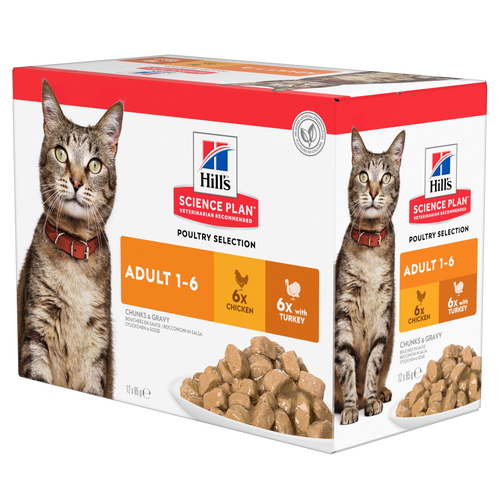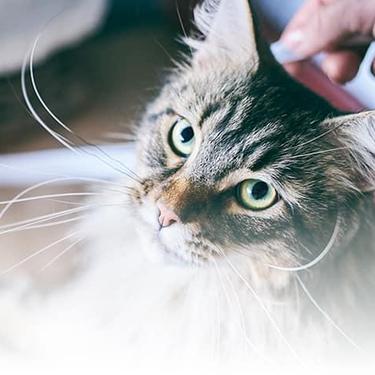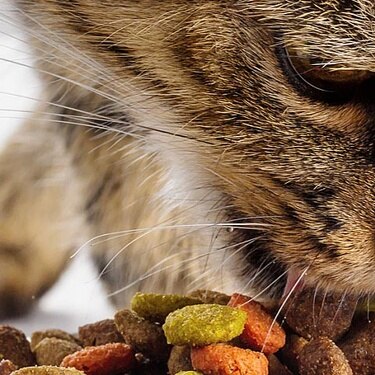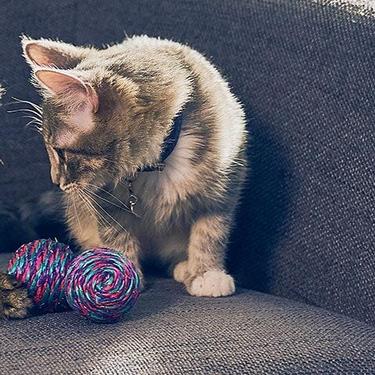
-
Find the right food for your petTake this quiz to see which food may be the best for your furry friend.Find the right food for your petTake this quiz to see which food may be the best for your furry friend.Featured products
 Mature Adult Dog Food
Mature Adult Dog FoodHill's Science Plan Mature Adult Multipack Wet Dog Food with Chicken & Beef are complete premium pet foods for mature adult dogs from 7 years. Your dog will love these deliciously smooth and savoury minced loaves, formulated to deliver the appropriate amount of energy to support the needs of adult dogs.
Shop Now Puppy Food
Puppy FoodHill's Science Plan Puppy Multipack Wet Dog Food with Chicken & Beef are complete premium pet foods for growing puppies from weaning until 1 year old and for pregnant and nursing dogs. Your puppy will love these deliciously smooth and savoury minced loaves, formulated for balanced nutrition and overall health.
Shop Now Adult Wet Dog Food with Beef
Adult Wet Dog Food with BeefHill's Science Plan Adult Multipack Wet Dog Food with Chicken, Beef & Turkey are complete premium pet foods for adult dogs from 1 year. Your dog will love these deliciously smooth and savoury minced loaves, formulated for balanced nutrition and overall health.
Shop NowFeatured products Light Adult Multipack Wet Cat Food with Chicken & Ocean Fish
Light Adult Multipack Wet Cat Food with Chicken & Ocean FishTender chicken chunks in gravy for cats, with L-carnitine and fewer calories for ideal weight management. Packed with high-quality protein, omega-6s, and vitamin E for shiny fur and healthy skin.
Shop Now Mature Adult Wet Cat Food with Chicken
Mature Adult Wet Cat Food with Chicken
Tender chicken chunks in gravy for mature adult cats. Made with easy-to-digest ingredients, high-quality protein for lean muscle maintenance and antioxidant vitamins C+E for optimal health.
Shop Now Adult Multipack Wet Cat Food with Beef, Ocean Fish & Chicken
Adult Multipack Wet Cat Food with Beef, Ocean Fish & ChickenTender chunks in gravy for cats, with high-quality protein to maintain lean muscle. With vitamin E and omega-3s & -6s for healthy skin and balanced minerals to support healthy vital organs.
Shop Now -
Dog
- Dog Tips & Articles
-
Health Category
- Weight
- Food & Environmental Sensitivities
- Urinary
- Digestive
- Joint
- Kidney
-
Life Stage
- Puppy Nutrition
- Adult Nutrition
- Senior Nutrition
Cat- Cat Tips & Articles
-
Health Category
- Weight
- Skin & Food Sensitivities
- Urinary
- Digestive
- Kidney
-
Life Stage
- Kitten Nutrition
- Adult Nutrition
Featured articles The Incredible Science Behind Your Pet's Microbiome
The Incredible Science Behind Your Pet's MicrobiomeLearn what your pet's microbiome is, how it contributes to your pet's gut and overall health, and why nutrition is important in maintaining healthy microbiomes.
Read More Show some love with wet foods: a great choice for pets with health issues
Show some love with wet foods: a great choice for pets with health issuesShow some love with wet foods: a great choice for pets with health issues.
Read More The Right Diet For Your Pet
The Right Diet For Your PetIn people, the right diet is very important. If you are eating the wrong way for your metabolism, activity level, age and lifestyle you could end up with health issues.
Read More -


Nature is a wonderful and fascinating thing. Like all mammals and humans, cats have billions of organisms like bacteria in the gut, collectively known as the gut microbiome, that play a part in a whole host of natural processes. Cats have what is known as a symbiotic relationship with these organisms, which means they live together and benefit each other in many ways.
There are lots of different microbiomes in your cat’s body, such as on the skin and in the mouth, but the gut microbiome is a bit of a star. In fact, lots of scientists are excited about the gut microbiome because research is discovering more of the amazing and important roles that it plays in health every day.
This is where prebiotics come in…
What are prebiotics and what do they do?
Prebiotics are types of fibre that nourish the organisms of the microbiome (even microorganisms have to eat, right?).
Fibre in foods can be largely divided into soluble (dissolves in water) and insoluble (does not dissolve). Prebiotics are soluble fibres found in ingredients such as beet pulp, flaxseed and pumpkin. They feed the “good bacteria” of the microbiome, so they’re absolutely essential for maintaining a healthy balance, just as nature intended.
The good bacteria break down food ingredients, such as fibre, that your cat’s body can’t. This breakdown produces short-chain fatty acids, among other nutrients, that nourish the gut cells and keep the gut healthy. This, in turn, helps to keep out harmful bacteria by strengthening the gut barrier. The good guys also help produce important vitamins and boost the immune system, keeping “unhealthy” bacteria in check.
You may have heard the term “probiotics” as well, and it’s important to know the difference between the two.


Tasty Tips
Prebiotics vs probiotics
Probiotics are the good bacteria themselves. A probiotic supplement is aimed at bolstering the good bacteria population by simply adding more of them. While this is certainly positive, promoting gut health and protecting against certain diseases, probiotics have certain downsides compared to prebiotics.
The stomach is a savage, acidic environment. Many of the bacteria in probiotic supplements don’t survive this, so they don’t make it to the part of the gut where they’re needed. Moreover, compared to the trillions of bacteria within the gut microbiome, even the millions of bacteria that survive the stomach environment are only a very small fraction of the total. The effects of probiotics are therefore often short-lived.
Prebiotics, however, are untouched by the stomach acid and will therefore always get to where they’re needed. And because they’re fibres, prebiotics can have other benefits, too.
The many benefits of prebiotics for your cat
Fibre helps to slow down the movement of food through the bowels, so it can help with cases of diarrhoea. On the other hand, it bulks up the stools, so it can also help in cases of constipation too. Clever, eh?
Fibre also helps your cat feel fuller for longer, so it can help keep them slim and fit, or help them tackle any weight issues they may have.
The gut microbiome is also really important for your cat’s immune system. Keeping this environment, and the good bacteria that live there, well-nourished helps to fight infection, keep the immune system strong, and reduce the incidence of auto-immune diseases.
It’s important to remember that all diets should be complete and balanced, so always check with your veterinarian before simply adding an ingredient or changing to a new food.
Reviewed by Dr. Hein Meyer, DVM, PhD, Dipl-ECVIM-CA


One of our staff authors prepared this article for you
Related products

Tender chunks in gravy for cats, with high-quality protein to maintain lean muscle. With vitamin E and omega-3s & -6s for healthy skin and balanced minerals to support healthy vital organs.

Tender chicken chunks in gravy for cats, with L-carnitine and fewer calories for ideal weight management. Packed with high-quality protein, omega-6s, and vitamin E for shiny fur and healthy skin.

Tender chicken chunks in gravy for mature adult cats. Made with easy-to-digest ingredients, high-quality protein for lean muscle maintenance and antioxidant vitamins C+E for optimal health.

Related articles

Learn how to make homemade cat treats that are healthy for your pet with this recipe from Hills Pet Nutrition.

From essential vitamins & minerals to different types of meat, learn what to look for when choosing the best cat food for your feline.

Kittens grow a lot in their first year, so it is important to provide them with the proper nutrients early, so they grow up healthy and strong. Learn more.

There are three common ways to feed a cat. Each way has its advantages and disadvantages.

Put your cat on a diet without them knowing
Our low calorie formula helps you control your cat's weight. It's packed with high-quality protein for building lean muscles, and made with purposeful ingredients for a flavourful, nutritious meal. Clinically proven antioxidants, Vitamin C+E, help promote a healthy immune system.
Put your cat on a diet without them knowing
Our low calorie formula helps you control your cat's weight. It's packed with high-quality protein for building lean muscles, and made with purposeful ingredients for a flavourful, nutritious meal. Clinically proven antioxidants, Vitamin C+E, help promote a healthy immune system.

